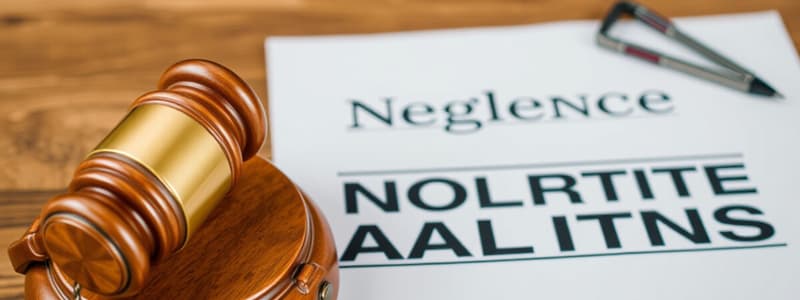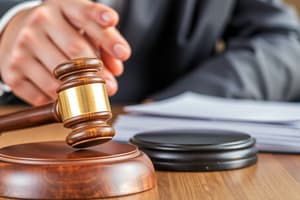Podcast
Questions and Answers
What is the primary focus of liability policies?
What is the primary focus of liability policies?
- To cover criminal activities
- To insure intentional torts of insureds
- To protect against all forms of liabilities
- To insure unintentional torts of insureds (correct)
Which of the following statements correctly defines negligence?
Which of the following statements correctly defines negligence?
- Omission to act that a reasonable person would perform (correct)
- Acting with complete disregard for others
- Doing something reasonable that a prudent person would not do
- Performing a duty without any potential harm
In order to establish negligence, which must be proven?
In order to establish negligence, which must be proven?
- That the action was intentional
- That the defendant had prior experience in the matter
- That the results were intentionally caused
- That a legal duty was owed and breached (correct)
What is the primary distinction of strict liability compared to negligence?
What is the primary distinction of strict liability compared to negligence?
Which of the following situations would likely fall under strict liability?
Which of the following situations would likely fall under strict liability?
What does the legal term 'damages' refer to?
What does the legal term 'damages' refer to?
Under strict liability, who bears the burden of proof?
Under strict liability, who bears the burden of proof?
What is a common element among activities deemed as strict liability?
What is a common element among activities deemed as strict liability?
What is the primary responsibility of property owners towards their neighbors and passers-by?
What is the primary responsibility of property owners towards their neighbors and passers-by?
Under what circumstance is a landlord NOT liable for injuries to tenants?
Under what circumstance is a landlord NOT liable for injuries to tenants?
What type of liability do occupiers face when they bring a dangerous item onto their premises?
What type of liability do occupiers face when they bring a dangerous item onto their premises?
When is a landlord presumed to have provided premises that are fit for purpose?
When is a landlord presumed to have provided premises that are fit for purpose?
What grounds can tenants use for claiming damages against a landlord?
What grounds can tenants use for claiming damages against a landlord?
In buildings with multiple tenancies, who is responsible for the common areas?
In buildings with multiple tenancies, who is responsible for the common areas?
What does the legal duty of occupiers entail regarding the maintenance of their property?
What does the legal duty of occupiers entail regarding the maintenance of their property?
What type of liability applies when a landlord has specifically contracted to maintain the premises?
What type of liability applies when a landlord has specifically contracted to maintain the premises?
What is the definition of a trespasser in terms of property ownership?
What is the definition of a trespasser in terms of property ownership?
What legal duty is owed by the occupier to a licensee?
What legal duty is owed by the occupier to a licensee?
Under which legal framework is a tenant liable for damages caused to a rented property due to negligence?
Under which legal framework is a tenant liable for damages caused to a rented property due to negligence?
What defines a bailee for hire?
What defines a bailee for hire?
Which of the following statements about invitees is true?
Which of the following statements about invitees is true?
What distinguishes a licensee from a trespasser?
What distinguishes a licensee from a trespasser?
What type of liability do employers have for their employees under common law?
What type of liability do employers have for their employees under common law?
Which of the following is NOT applicable in BC, AB, ONT, and NS regarding the classification of individuals on property?
Which of the following is NOT applicable in BC, AB, ONT, and NS regarding the classification of individuals on property?
Which term describes the situation where an employer is indirectly responsible for the actions of an employee?
Which term describes the situation where an employer is indirectly responsible for the actions of an employee?
What must bailees for hire demonstrate regarding the care of a customer's property?
What must bailees for hire demonstrate regarding the care of a customer's property?
What must be true for someone to be considered an invitee?
What must be true for someone to be considered an invitee?
What actions are occupiers forbidden to take towards trespassers?
What actions are occupiers forbidden to take towards trespassers?
If damage occurs due to a bailor’s negligence, who is liable under Tort Law?
If damage occurs due to a bailor’s negligence, who is liable under Tort Law?
In what situation are employers NOT liable for the actions of their employees?
In what situation are employers NOT liable for the actions of their employees?
Which of the following best describes the duty of care owed to a trespasser compared to a licensee?
Which of the following best describes the duty of care owed to a trespasser compared to a licensee?
Which statement is true about tenant liability as defined in contract law?
Which statement is true about tenant liability as defined in contract law?
Under what circumstances can occupiers share liability with independent contractors?
Under what circumstances can occupiers share liability with independent contractors?
What is the primary concern when two or more tortfeasors are responsible for the same tort action?
What is the primary concern when two or more tortfeasors are responsible for the same tort action?
What is the liability of a dog owner when their dog bites someone, according to common law?
What is the liability of a dog owner when their dog bites someone, according to common law?
What is a significant requirement for owners of certain dangerous dog breeds in some municipalities?
What is a significant requirement for owners of certain dangerous dog breeds in some municipalities?
Which statement reflects the liability of wild animal owners according to common law?
Which statement reflects the liability of wild animal owners according to common law?
When multiple tortfeasors are involved in a case, what does the law ensure for the plaintiffs?
When multiple tortfeasors are involved in a case, what does the law ensure for the plaintiffs?
What happens if the work contracted by an independent contractor involves inherently dangerous activities?
What happens if the work contracted by an independent contractor involves inherently dangerous activities?
In case of defective equipment leading to injury, who is liable?
In case of defective equipment leading to injury, who is liable?
Flashcards
Tort Law
Tort Law
Involves intentional or unintentional invasions of another's rights, allowing harmed individuals to sue for compensation.
Intentional Tort
Intentional Tort
A wrong done on purpose.
Unintentional Tort
Unintentional Tort
A wrong done through carelessness or negligence.
Negligence
Negligence
Signup and view all the flashcards
Strict Liability
Strict Liability
Signup and view all the flashcards
Liability Insurance
Liability Insurance
Signup and view all the flashcards
Trespasser
Trespasser
Signup and view all the flashcards
Licensee
Licensee
Signup and view all the flashcards
Invitee
Invitee
Signup and view all the flashcards
Occupier's Duty of Care
Occupier's Duty of Care
Signup and view all the flashcards
Damages (tort law)
Damages (tort law)
Signup and view all the flashcards
Vicarious Liability
Vicarious Liability
Signup and view all the flashcards
Joint Liability
Joint Liability
Signup and view all the flashcards
Bailee
Bailee
Signup and view all the flashcards
Negligent Bailee
Negligent Bailee
Signup and view all the flashcards
Landlord Liability
Landlord Liability
Signup and view all the flashcards
Tenant Liability
Tenant Liability
Signup and view all the flashcards
Study Notes
Tort Law Overview
- Torts involve intentional or unintentional invasions of another's rights, allowing wronged parties to sue for damages.
- Liability insurance primarily covers unintentional torts committed by insured individuals.
Classification of Torts
- Torts are divided into two major categories: intentional and unintentional torts.
Unintentional Torts: Negligence
- Negligence is defined as carelessness, involving omissions or actions that a reasonable person would not undertake.
- Legal duty owed to the plaintiff must be proven, showing that the defendant’s carelessness resulted in a breach.
- Results of negligence must be foreseeable; negligent acts are only actionable if outcomes could have been reasonably expected.
Strict Liability
- Some activities create liability regardless of fault; the defendant may be presumed guilty until proven innocent.
- Common examples include storing hazardous materials and manufacturing dangerous products.
Transferring Financial Responsibility
- Legal actions can cause financial strain; damages represent monetary awards determined by courts.
- Insurance companies often take on the financial responsibility for civil wrongs.
Important Legal Precedents: Ownership of Property
- The rights of individuals entering premises vary based on their status as trespassers, licensees, or invitees.
Trespassers
- Enter without permission; occupiers have a duty of care to ensure their safety and cannot intentionally cause harm.
Licensees
- Enter with permission for personal purposes; occupiers must protect licensees from known hazards but owe less duty than to invitees.
Invitees
- Individuals who enter for mutual benefit; occupiers must ensure their safety and maintain premises.
Children
- Occupiers must maintain property to prevent harm to children, reflecting a higher standard of care for minors.
Liability of Landlords
- Landlords are generally not responsible for the fitness of rented premises unless they explicitly warrant it or conceal defects.
- Exceptions exist where landlords are liable for injury due to failure to maintain furnished premises or common areas.
Liability of Tenants
- Tenants are liable for damages to the property due to negligence and this can arise under tort law or contract law.
Liability of a Bailee
- Bailees for hire must exercise ordinary care over customers' property.
- They may be held liable for damages due to negligence in handling the property.
Employer's Liability
- Employers are liable for torts committed by employees during their employment, known as vicarious liability.
- Employers are not liable for actions outside the scope of employment, except in inherently dangerous situations.
Joint Liability
- In cases of multiple tortfeasors, plaintiffs can collect full damages from any one party, incentivizing responsible parties to settle claims.
Liability for Animals
- Dog owners are liable from the first bite, with no “free bite” rule.
- Owners of wild animals are strictly liable for injuries caused, reflecting their natural propensity for harm.
Studying That Suits You
Use AI to generate personalized quizzes and flashcards to suit your learning preferences.




